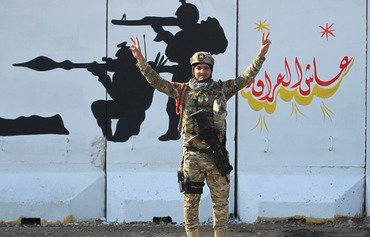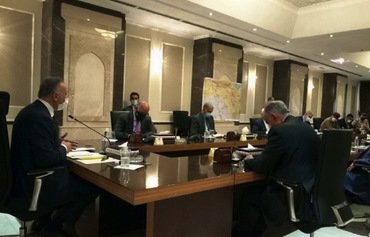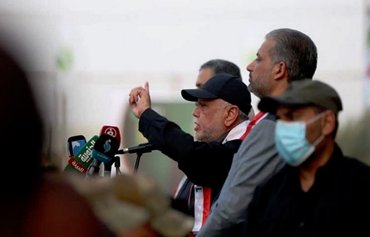Iraqi Prime Minister Haider al-Abadi has repeatedly assured the Iraqi people that the country's next war will be a fight against the scourge of corruption.
He most recently made the pledge during a Saturday (December 9th) speech announcing the Iraqi victory over the "Islamic State of Iraq and Syria" (ISIS).
Previously, on November 21st, the prime minister promised to crack down on financial and administrative corruption in all government institutions.
"The coming war will be against the corrupt ones," he said, stressing the need for comprehensive economic reform in both public and private sectors.
![This file photo taken on October 5th shows Iraqi Prime Minister Haider al-Abadi giving a press conference in Paris. Announcing "the end of the war" in Iraq against ISIS a few days later, on December 9th, al-Abadi declared that Iraq's next fight would be against corruption. [Ludovic Marin/POOL/AFP]](/cnmi_di/images/2017/12/18/10704-Iraq-prime-minister-600_384.jpg)
This file photo taken on October 5th shows Iraqi Prime Minister Haider al-Abadi giving a press conference in Paris. Announcing "the end of the war" in Iraq against ISIS a few days later, on December 9th, al-Abadi declared that Iraq's next fight would be against corruption. [Ludovic Marin/POOL/AFP]
"Just like ISIS [elements] were given the choice between surrendering or dying, today I am giving corrupt individuals the chance to either return stolen public funds or go to prison," he said.
"The corrupt ones tried to set fire to Iraq and distract it from the war on ISIS," he said. "I promise all Iraqis that we will triumph over corruption as we did with ISIS."
'Two sides of the same coin'
"Waging a war on corruption right now is merely the natural next step after the war on terrorism, as terrorism relies on illegal funds, money laundering and racketeering," said Iraqi MP Faris al-Faris.
Corruption and terrorism are two sides of the same coin, he told Diyaruna.
Terrorism could come back if corrupt money is allowed to remain in the system and if administrative and financial corruption remains deeply entrenched in government institutions, he said.
"If we want to preserve the victory we have achieved over ISIS, we have to strike corruption with an iron fist and cut off any source that would allow terrorism to flourish again in the country," he added.
Iraq MP for Ninawa province Abdul Rahman al-Loizi said the corrosive effect of corruption is manifest not only in "the direct or indirect funding of terrorist groups", but also in weakened government institutions, including the army.
This allows terrorism to grow and take root, he told Diyaruna.
"The military institutions of a corrupt state also will be corrupt and will, in turn, limit its ability to confront terrorism," he said.
A war on corruption is of utmost importance, he added, as it is necessary to ensure that any person or entity that funds terrorism and helps it grow stronger is blocked.
"All components of this war are currently in place," he said, from the relevant authorities, which include the Office of Fiscal Monitoring, the Integrity Institute and parliament, to laws designed to bring corrupt individuals to justice.
Serious steps are needed
The fight against corruption is "a tough battle to win", Baghdad University political sciences professor Ali al-Jubury told Diyaruna.
"The source of corrupt money that is funnelled to terrorist and extremist groups will not easily dry up, unless the government works hand-in-hand with all sectors of society and political groups in the country," he said.
The process will be difficult and fraught with danger, he added, as corruption permeates society and has created significant defences to protect its interests over time.
"As a result, standing in the way of deeply corrupt individuals will not be easy, but is not an impossible task," he added.
Any anti-corruption campaign launched now will garner "unparalleled" popular support, al-Jubury said, because the average citizen has been hurt by corruption and corrupt individuals in office.
The government needs to take serious steps to clamp down on corruption and gain the trust of the people, he said, such as detaining big offenders and repatriating stolen money that had been channelled to foreign countries.
Success in the war on corruption will be determined by the will of the government and support from government institutions, education and religious authorities, the media and families and individuals themselves, he said.

![Iraqi women take part in a September 15th demonstration in Baghdad against corruption in Iraq. Protesters also demanded reform and a change in the electoral system. [Ahmad al-Rubaye/AFP]](/cnmi_di/images/2017/12/18/10703-Iraq-anti-corruption-600_384.jpg)






